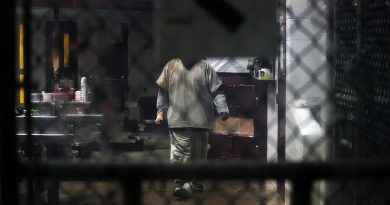Capitol rioters' Trump donations show how much they bought into his election fraud lie
After President Donald Trump lost re-election, he immediately began asking his supporters for money, a plea that he insisted was necessary to bankroll his fight built on the false claim that the election was stolen through rampant fraud.
James Uptmore, like hundreds of other people, opened his wallet. Weeks later, he was among those who stormed the U.S. Capitol, federal prosecutors say.
An NBC News analysis of campaign finance filings found that in the five weeks after the election, those charged in the Capitol riot increased their political donations by about 75 percent compared to the five weeks leading up to the election. Many had made very few or no donations at all in previous years, but they began escalating their numbers of contributions as Trump was trying to overturn Joe Biden's victory.
Trump and his aligned groups, including the Republican National Committee, raised $207.5 million in the 19 days after the election.
#embed-20210322-political-donations-capitol-rioter iframe {width:1px;min-width:100%;}
Uptmore, 63, of San Antonio, made just a single $250 donation to a Trump PAC between Trump's first run for president and the 2020 election, according to the Federal Election Commission. That all changed in the weeks after the Nov. 3 election.
On Nov. 15, the day Trump wrote on Twitter that he would not concede, Uptmore made five contributions to the president and his aligned groups. Three days later, when Trump tweeted, "I WON THE ELECTION. VOTER FRAUD ALL OVER THE COUNTRY," Uptmore made four more donations.
The next day, Uptmore made four more donations as Trump's attorneys held a news conference spreading wild conspiracies about the vote. And on Dec. 18 — when Trump tweeted at Republican senators to "FIGHT FOR IT. Don't let them take it away!" — Uptmore made six such contributions.
In total, Uptmore would make nearly 40 donations to Trump, the RNC and aligned groups after Trump's loss. And on Jan. 6, federal prosecutors allege, he and his son, Chance, were among the crowd that illegally breached the Capitol.
"I think, quite simply, it shows the effectiveness of Trump's messaging in the weeks leading up to the election and then how much his stolen election lie resonated with his base after the election," said Kurt Braddock, an assistant professor of public communication at American University and a fellow at its Polarization and Extremism Research and Innovation Lab. "Trump sold the idea to his followers that not only was the election stolen, but also that it was up to his constituents to help make things 'right.'"
James Horgan, who runs the Violent Extremism Research Group at Georgia State University, said he found the increase in contributions to be "unsurprising," partly because Trump had primed supporters for months.
"Trump successfully convinced many of his followers that unless they acted, and acted fast, their very way of life was about to come to an end," Horgan said. "He presented a catastrophic scenario whereby if the election was — for him — lost, his followers would suffer as a result. He made action not just imperative, but urgent, convincing his followers that they needed to do everything they could now, rather than later, to prevent the 'enemy' from claiming victory."
'Passion for Trump'
Among the first 311 people who face federal charges after the Jan. 6 riot, about 90 have histories of making political contributions. And the overwhelming majority of them were made to Trump or his aligned groups and within the past year.
The donations shed light on the political activities and leanings of the people accused in the riot — and on the effectiveness of Trump's post-election messaging, which has netted him hundreds of millions of dollars in contributions, many from small-dollar donors like those accused of storming the Capitol.
Elizabeth Neumann, who was assistant secretary of homeland security for counterterrorism and threat prevention before she left the Trump administration and endorsed Biden, said the donor findings reveal "a useful proof point to the argument that there were monetary drivers behind the Big Lie."
"It's also a useful quantitative metric for demonstrating the increased level of grievance of Trump supporters post-election," she said.
Neumann said she believes a donor's history could be useful to the Justice Department should it seek to make "a seditious conspiracy or incitement-to-violence case."
"It shows a direct tie between the lies that the election was stolen and people's deepening passion for Trump — they were seeing the money roll in and knew that the messaging was working," she said.
Some of those charged in connection with the riot made their first political contributions after the election, donating to Trump, the RNC or groups like the Trump Make America Great Again Committee. Several more made their first donations to political causes and candidates during the 2020 campaign cycle.
"I think the thing that's clear is that the people who took over the Capitol are not interested in the political process," Eric Wilson, a Republican political technologist, said in an interview, pointing to analysis that showed that some people accused in the riot did not vote in the election. "They donated to campaigns after the votes had already been cast," revealing that "they are only interested in the chaos, not the process," he said.
More than 50 politicians, political action committees and other groups and causes received donations from those charged in the riot. They include Republicans like former Sens. David Perdue and Kelly Loeffler of Georgia; House Minority Leader Kevin McCarthy of California; Sens. Steve Daines of Montana, Lindsey Graham of South Carolina and Susan Collins of Maine; Reps. Burgess Owens of Utah and Elise Stefanik of New York; failed candidates like Kim Klacik, a House candidate in Maryland, Joe Collins, a House candidate in California, and Kris Kobach, a Senate candidate in Kansas; the National Republican Senatorial Committee; and the National Republican Congressional Committee.
'Cash cow'
The bulk of the donations went to Trump and his aligned groups — about 75 percent of the more than 900 such donations funneled there.
"Part of this, there's this very cynical view that this was just a total cash cow for people to fundraise off of vulnerable folks," Thomas Zeitzoff, an associate professor of political science at American University who studies political violence, said in an interview.
Yet a number of Republicans have claimed that the riot was not the product of a pro-Trump mob. They say it was driven by left-wing groups trying to damage Trump — which a majority of Trump voters believe, according to a Suffolk University/USA Today poll last month.
Some Democrats also got donations from people alleged to have been rioters, including a handful of years-old contributions to former President Barack Obama and Sen. Bernie Sanders, I-Vt., and more recent contributions to Democratic presidential candidates Andrew Yang and Tulsi Gabbard, who had followings on the political right.
A man charged in the riot, Brian McCreary, who was photographed inside the Capitol alongside the "QAnon Shaman," Jacob Chansley, made 34 donations to Yang from 2018 through 2020.
Wilson, the Republican digital strategist, chalked up the riot to people who were gullible.
"I don't know that there's a bigger story to tell other than there are a lot of dumb people in the world," he said. "And a lot of them stormed the Capitol on January 6th."
Source: Read Full Article


